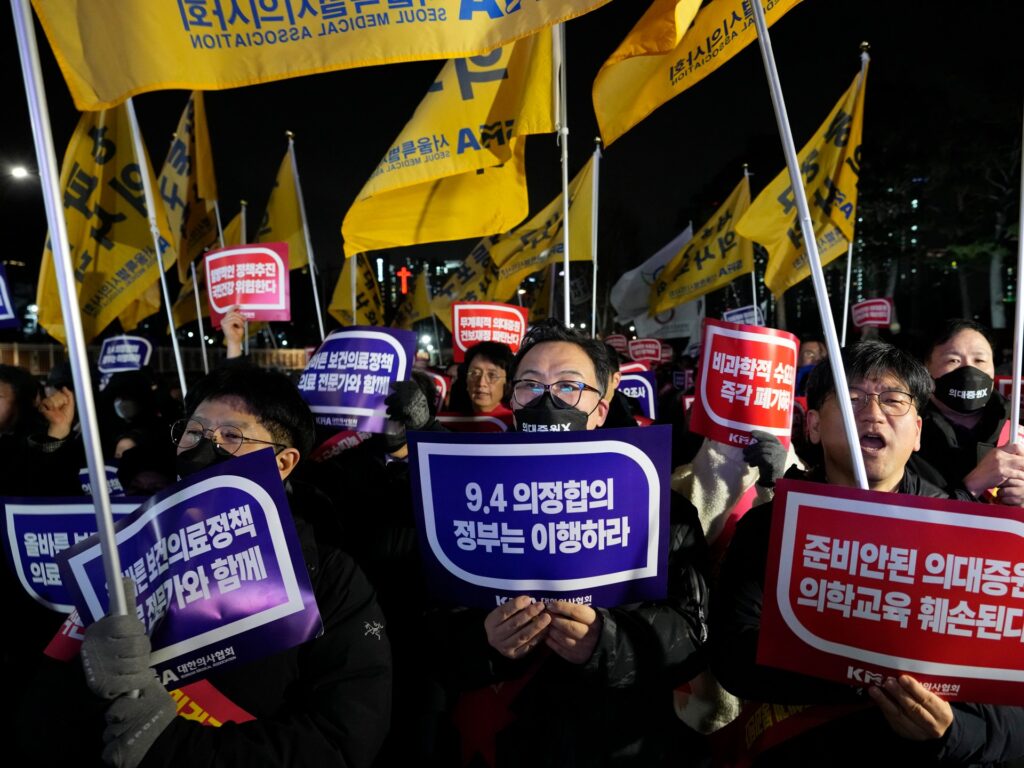As resident doctors continue their strike over medical reform, Seoul's largest hospital has cut the number of surgeries by one-third.
South Korean hospitals are being forced to cancel or postpone surgeries and medical procedures, including cancer treatments, as more medical trainees quit in protest of proposed medical reforms, according to media reports.
Thursday's report came as South Korea's government called for talks with doctors and threatened to arrest strike leaders.
So far, around 9,275 trainee doctors, almost two-thirds of the country's young doctors, have taken part in protests against the government's plans to increase the number of students admitted to medical schools. .
The plan was announced as part of efforts to strengthen health systems in one of the world's fastest aging societies.
Doctors argue that the changes will have a negative impact on the quality of service delivery and education, but critics primarily worry that the changes will hurt their salaries and social prestige. Doctors in training say they are concerned.
Yonhap News, citing medical personnel, reported that five of the largest general hospitals in South Korea's capital, Seoul, had to suspend operations and drastically reduce operations and medical procedures.
“At Severance Hospital in central Seoul, the number of surgeries was halved, and at St. Mary's Hospital and Asan Medical Center in southern and eastern Seoul, their surgical capacity was reduced by 30%,” the agency reported.
This included patients awaiting treatment for cancer and pregnant women.
Hong Jae-ryeong, a brain tumor patient in her 50s, told AFP news agency that chemotherapy has been postponed without a clear date due to the current situation, even though the cancer has spread to her lungs and liver. Told.
“It's unreasonable. What can a helpless patient say in the midst of a conflict between the government and doctors? I feel betrayed,” Hong said. “It seems to me that this is going too far when there is no one you can trust or rely on other than your doctor.”
Meanwhile, the Hankyoreh newspaper reported that some hospitals are postponing caesarean sections for pregnant women and telling them epidural anesthesia will not be available during delivery.
Severance Hospital officials said the facility “does not have anesthesiology residents or residents, which means we cannot administer epidurals.”
On Tuesday, the government led by President Yun Seok-yeol ordered the striking doctors to return to work and announced that it would seek arrest warrants and begin investigations against the doctors who led the strike.
According to Yonhap News, the government said, “If illegal collective actions actually cause harm to the lives and health of patients, (training doctors) will bear the highest level of responsibility.''
Meanwhile, public opinion polls show that most South Koreans support the government's plan, with a recent Korean Gallup poll showing that around 76 percent of respondents regardless of political affiliation supported it. It is shown.
But protesters say South Korea has enough doctors and the government needs to increase salaries and reduce workloads, especially in key fields such as pediatrics and emergency medicine, before recruiting more students. are doing.
Park Dan, chairman of the Korean Interns and Residents Association, who is participating in the protest, said he would be willing to be arrested if it meant getting the doctors' demands met.
“Everyone is angry, everyone is dissatisfied, so everyone is leaving the hospital. Please make our voices heard,” he said in a radio interview, adding that if the government is prepared to listen to their demands. He added that he was ready for dialogue.
Hundreds of doctors in Seoul plan to hold a rally in front of President Yoon's office later Thursday, the Seoul Medical Association said.


